|
|
|
Sort Order |
|
|
|
Items / Page
|
|
|
|
|
|
|
| Srl | Item |
| 1 |
ID:
148831


|
|
|
|
|
| Summary/Abstract |
A twenty-first century version of the Great Game is unfolding in Afghanistan, even as its internally fractured regime strives to stabilise a land ravaged by 14 years of war that has not yet ended. Once the arena of intense rivalry between the British Indian Empire, Tsarist Russia and the Chinese authorities, with Persia a keen watcher on account of the region’s geostrategic location as gateway to India, Persia, and Muslim Central Asia (part of the ancient Silk Road trade route), the stakes today are higher than ever before.
|
|
|
|
|
|
|
|
|
|
|
|
|
|
|
|
| 2 |
ID:
148834
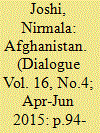

|
|
|
|
|
| Summary/Abstract |
India’s neighbourhood in its western part is in a state of flux. A new geopolitical situation is emerging in the wake of withdrawal of ISAF forces from Afghanistan, whose contours are not clear. Whatever be its shape, it will have ramifications on security, strategic, political and economic interests of India and other stake holders in the region’s stability and peace. Afghanistan has undergone political transition with President Ashraf Ghani assuming the Presidency. Hopefully the power sharing deal between President Ghani and Dr Abdullah Abdullah is in the interest of the country’s political future, and if not disrupted by forces inimical to democracy. All the stake holders in peace and stability in Afghanistan should support President Ghani’s efforts to consolidate democracy. At the same time insurgency has provrd to be a resilient force. The recent violent events in Kabul and elsewhere indicate that insurgency is alive and active. If past experience is anything to go by, it is not easy to wipe out insurgency, unless their financial and other supports are plugged. The future role of residual International Security Assistance Force (ISAF) is still not clear. In short, the region is heading towards uncertainty
|
|
|
|
|
|
|
|
|
|
|
|
|
|
|
|
| 3 |
ID:
148825
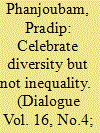

|
|
|
| 4 |
ID:
148838
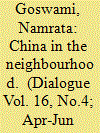

|
|
|
|
|
| Summary/Abstract |
The strategic significance of Northeast India from an Indian national security perspective cannot be over-emphasised. This landscape lies at the cusp (emphasis added) of Bangladesh, Bhutan, China and Myanmar with a terrain and ethnic character that is distinctive, challenging, picturesque and placid. “The strategic geography” is implicit with Chinese aggressive posturing across the Himalayas and Myanmar, coupled with cross-border non-state armed groups impacting daily life in this multifaceted landscape. The border and territorial disputes that led to the 1962 war have not disappeared with China continuing to stake claims on huge chunks of Indian territory (see Figure I). While the historical origin of that Chinese claim is based on manufactured antiquity, yet China continues to aggressively emphasize that history.
|
|
|
|
|
|
|
|
|
|
|
|
|
|
|
|
| 5 |
ID:
148837


|
|
|
|
|
| Summary/Abstract |
China’s leader Xi Jinping seems to have shifted the focus of his regime’s foreign policy, including that towards South Asia from core interests to economic interests. Xi’s statement that China is prepared to sign friendship treaties with the country’s neighbours and the PRC’s willingness to adopt a ‘trilateral’ ( i.e China, India and the concerned South Asian country) approach towards tackling issues in South Asia, signal Beijing’s new conciliatory thinking. Nonetheless, in terms of strategy, China under Xi Jinping shows no sign of any change – balancing India by supporting Pakistan appears to be the corner stone of Xi’s regional policy; suggesting it, is the China-Pakistan agreement on the need to have a ‘strategic balance’ in South Asia. In a broader sense, through his regional initiatives, Xi seems to be conveying a firm message to Asian nations– China will use its increasing power to create an Asian order which is favourable to it.
|
|
|
|
|
|
|
|
|
|
|
|
|
|
|
|
| 6 |
ID:
148839


|
|
|
|
|
| Summary/Abstract |
Democracy is that institutional arrangement which seeks to realize the common societal good of the people through free exercise of their right to elect their representatives, who would have the power to take decisions on behalf of them. All people having therefore to agree, in principle at least, that there is also a common will of the people. To manage the common good, it requires special attitudes and techniques. These specialists simply act in order to carry out the will of the people exactly as the doctor acts in order to carry out the will of his patients to get well. It is also true that in a community it would be highly inconvenient for every individual citizen to get into contact with all other citizens on every issue in order to do his part in governing. It will be more convenient to reserve only the most important decisions and to deal the rest through a committee appointed by them — an Assembly, Parliament, Senate and others whose members will be elected by popular vote.
|
|
|
|
|
|
|
|
|
|
|
|
|
|
|
|
| 7 |
ID:
148836
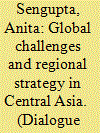

|
|
|
|
|
| Summary/Abstract |
The global war on terror dramatically reinforced the significance of security in the Eurasian region, which had been seemingly on the wane since 1989, but the notion of security that came with it was different from that which had come before.1 In the post 9/11 world, security became a much more expansive, fluid and an uncertain concept. While the State employed traditional military means to achieve security, the State no longer seemed to be the container of security. Terrorism, as the primary security threat, seemed to render the stark division between external and internal threat meaningless. This uncertainty of security has multiplied the sites at which ‘security’ may be found. Traditional sites, such as militaries and conflict, have been rearticulated but they have been joined by border fences, detention centres, airport security counters, places of worship and even universities. However, even as insecurity processes become increasingly transnational and even global in their dynamics and scope, many States continue to be profound sources of insecurity both to other States and people.
|
|
|
|
|
|
|
|
|
|
|
|
|
|
|
|
| 8 |
ID:
148827


|
|
|
|
|
| Summary/Abstract |
The quest for normalisation of relations with Pakistan is arguably a fundamental problem in India’s Pakistan policy. The experience of the last seven decades should have informed Indian policy makers that this desire is akin to chasing a mirage, and just as fruitless. In fact, as long as India continues to hanker for normal relations, it will continue to go round and round in endless circles and keep repeating the same mistakes and keep suffering the same consequences that it has been since Partition. What India must strive for is managing the Pakistan problem and severely reducing, if not entirely eliminating, Pakistan’s ability to either counter-balance India or even keep India off-balance through use of ‘non-state actors’ and asymmetric warfare.
|
|
|
|
|
|
|
|
|
|
|
|
|
|
|
|
| 9 |
ID:
148835


|
|
|
|
|
| Summary/Abstract |
The decade following the international intervention in Afghanistan in 2001 facilitated Indian presence in Afghanistan in the form of “effective” aid and assistance which resulted in remarkable goodwill and high appreciation for India and Indian democracy. India’s engagement was also gradually accepted by the international community for the role that she could play in Afghan reconstruction and as a provider of regional stability.
|
|
|
|
|
|
|
|
|
|
|
|
|
|
|
|
| 10 |
ID:
148828
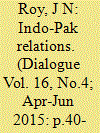

|
|
|
|
|
| Summary/Abstract |
Indo-Pak relations have never been easy during the last sixty-seven years. More one tries to change it, more it remains the same. Four wars, including Kargil (1999), numerous rounds of talks, efforts by outside powers to mediate directly or indirectly, has not borne any fruit. Baggage of history of partition, deep suspicions and lack of trust and perceived grievances have made India and Pakistan adversorial neighbours. Any change must address the need for an attitudinal and structural shift between a “status quoist” India and “Revisionist” Pakistan. Thus, the only way forward is to jettison the past and mutual prejudices and shibboleths it has spawned. Indo-Pak relations can only normalise if both the countries decide to live in future and not in the past. For this one requires statesman like political culture in both the countries, which was visible for a brief period between 2004-2007, but has, alas, disappeared. It is the mindset which is the main problem and has to change. The Mumbai massacre (26.11.08) by Pakistan based LET/JUD and strong protest against the Prime Minister of India for agreeing to resume dialogue at Sharm-el-Sheikh (13 July, 2009), and presently reservations over the NDA govt.’s decision to resume dialogue process underlines that nothing has changed and that both the countries for the time being are condemned to live in their past. Presently, it may also be subject to external developments in the region.
|
|
|
|
|
|
|
|
|
|
|
|
|
|
|
|
| 11 |
ID:
148829
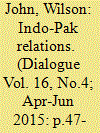

|
|
|
|
|
| Summary/Abstract |
India’s relationship with its immediate neighbour, Pakistan, has been fraught with uncertainty and distrust. India’s attempts to reach out to its difficult neighbour since 1947 have met with frustrating antagonism and war. Rarely has Pakistan responded to these overtures positively. And when it did, it has been with an ulterior motive to harm India and its interests. The result has been that the India-Pakistan relations have stood still at a crossroads, going nowhere, for more than half a century now.
|
|
|
|
|
|
|
|
|
|
|
|
|
|
|
|
| 12 |
ID:
148830
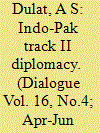

|
|
|
| 13 |
ID:
148832


|
|
|
|
|
| Summary/Abstract |
In 2009, as a part of the US troop surge, the Counterinsurgency (COIN) doctrine was first implemented in Afghanistan. This doctrine had accompanied a similar troop surge in Iraq in 2007, where it had won acclaim. Gen. Stanley A. McChrystal, who took over command in Afghanistan in the summer of 2009, and Gen. David Petraeus, who was then at the helm of the US Central Command, are credited with the switch to the COIN campaign. There are, however, divergent views on the efficacy and success of the Counterinsurgency campaign in Afghanistan.
|
|
|
|
|
|
|
|
|
|
|
|
|
|
|
|
| 14 |
ID:
148840


|
|
|
|
|
| Summary/Abstract |
Different kinds of perceived grievances give rise to different types of terrorist activities in different countries at different times. Controlling such terrorism requires a many-pronged approach and selective use of measures in each case. The core requirement, however, is actionable intelligence. Absence or inadequacy of such intelligence makes the task of security agencies difficult and quite often hazardous. Two recent cases in which intelligence failures caused terrible consequences are discussed in this paper.
|
|
|
|
|
|
|
|
|
|
|
|
|
|
|
|
| 15 |
ID:
148841
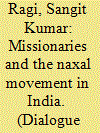

|
|
|
|
|
| Summary/Abstract |
Questions are often asked if there is an understanding between the Maoists and missionaries and the NGOs which have been working in the remote tribal areas for the sick, illiterate and poor. Do they actually lend a helping hand to the Maoists and their cause? Does the Western world which is so hostile towards the Islamic extremism and highly critical of communism, ignore the left extremism and provide strength by funding the same through the Non-governmental organizations working in the remote forest areas? And do they do so consciously because Maoists have been generous to the Christian missionaries, whose welfare and charitable activities, as well as the evangelical programmes, are primarily located in the tribal belts? These are the questions and many more which have been subjects of debate for long in India. While the right wing organizations have been accusing the missionaries and Maoists of having both covert and overt linkages, depending on the situation. The Christian organizations reject such premises and attribute them to a conscious campaign designed to denigrate their charitable work.
|
|
|
|
|
|
|
|
|
|
|
|
|
|
|
|
| 16 |
ID:
148824
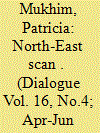

|
|
|
|
|
| Summary/Abstract |
It was interesting to read the recent exhortations of Mr. Isak Swu, Chairman, National Socialist Council of Nagalim (IM). Mr. Swu was greeting the people on the 36th Republic Day of the Nagas. The NSCN (IM) leadership has indulged in semantics for decades. Isak Swu and Th Muivah have perfected the art of diplomatic discourse while engaging with “India.” Now they use the same language to address their own people. Swu mentioned Naga psychology which he said has to be refurbished. He also said that tribalism, communalism and factionalism are the weapons of enemies of the people. Swu probably implies that the three ‘isms’ have been used by enemies of the Nagas to defeat their cause.
|
|
|
|
|
|
|
|
|
|
|
|
|
|
|
|
| 17 |
ID:
148842


|
|
|
|
|
| Summary/Abstract |
The present paper entitled “Subaltern Global Justice and National Identity” attempts to address three issues. First, globalization in itself is value free. It is neither good nor bad. It assumes a value when linked with the question of justice or injustice. The question of subaltern global justice is related to the third world and underdeveloped countries. The question of global justice involves the preferential treatment of underdeveloped nations. I think, globalization as a process of development is just and globalization as an instrument of exploitation is unjust. Globalization is faced with a dilemma. If we go against globalization, then we will be technologically backward and condemned to be poor and underdeveloped. The backwardness will cause poverty. As a matter of fact, poverty is a moral evil and responsible for many immoral activities. So in order to get rid of poverty and backwardness we have to accept technology based globalization. Peter Singer observes, “One hundred and fifty years ago,
|
|
|
|
|
|
|
|
|
|
|
|
|
|
|
|
| 18 |
ID:
148833


|
|
|
|
|
| Summary/Abstract |
The Af-Pak border of Durand Line has become more a symbol of body politic defying the corpus of State on either side by disenchanted Pashtuns who would commit violation of State law and cross over to the other side at will. The act that has had always brought the sovereignty of State to a naught, where violation seems the only possible way of nabbing the culprits. The questions of territoriality and borders have plagued Afghanistan and Pakistan in post-colonial times. The tribes have used mountainous terrain and porous border to defy the State and also change the narratives in favour of the host State that is used to strategic shelter.
|
|
|
|
|
|
|
|
|
|
|
|
|
|
|
|
| 19 |
ID:
148826


|
|
|
|
|
| Summary/Abstract |
On 23-26 July 2014, the European Association for South-Asian Studies (EASAS) held its biannual conference in Zürich, Switzerland. More than 150 participants came mostly from the EU and South Asia (including my first-ever acquaintance from the Maldives), with a delegation from the US (including someone originating in North Korea, a country exotic even to Orientalists), and a few from China, Japan and Australia. It was very well-organized down to the details. e.g., at most conferences, name-tags are half the time invisible because the white reverse side of the badge is showing; here the badges were printed recto verso. At the annual conference of the American Academy of Religion (AAR), it is very difficult to find your friends back because it is just too big and has no clear centre; here, everyone met for tea or lunch in a single central hall, and the seminar rooms were in a single building, not spread over the city as in the AAR conference of San Francisco 2012. The different sessions of a panel took place consecutively and formed a natural whole.
|
|
|
|
|
|
|
|
|
|
|
|
|
|
|
|
|
|
|
|
|